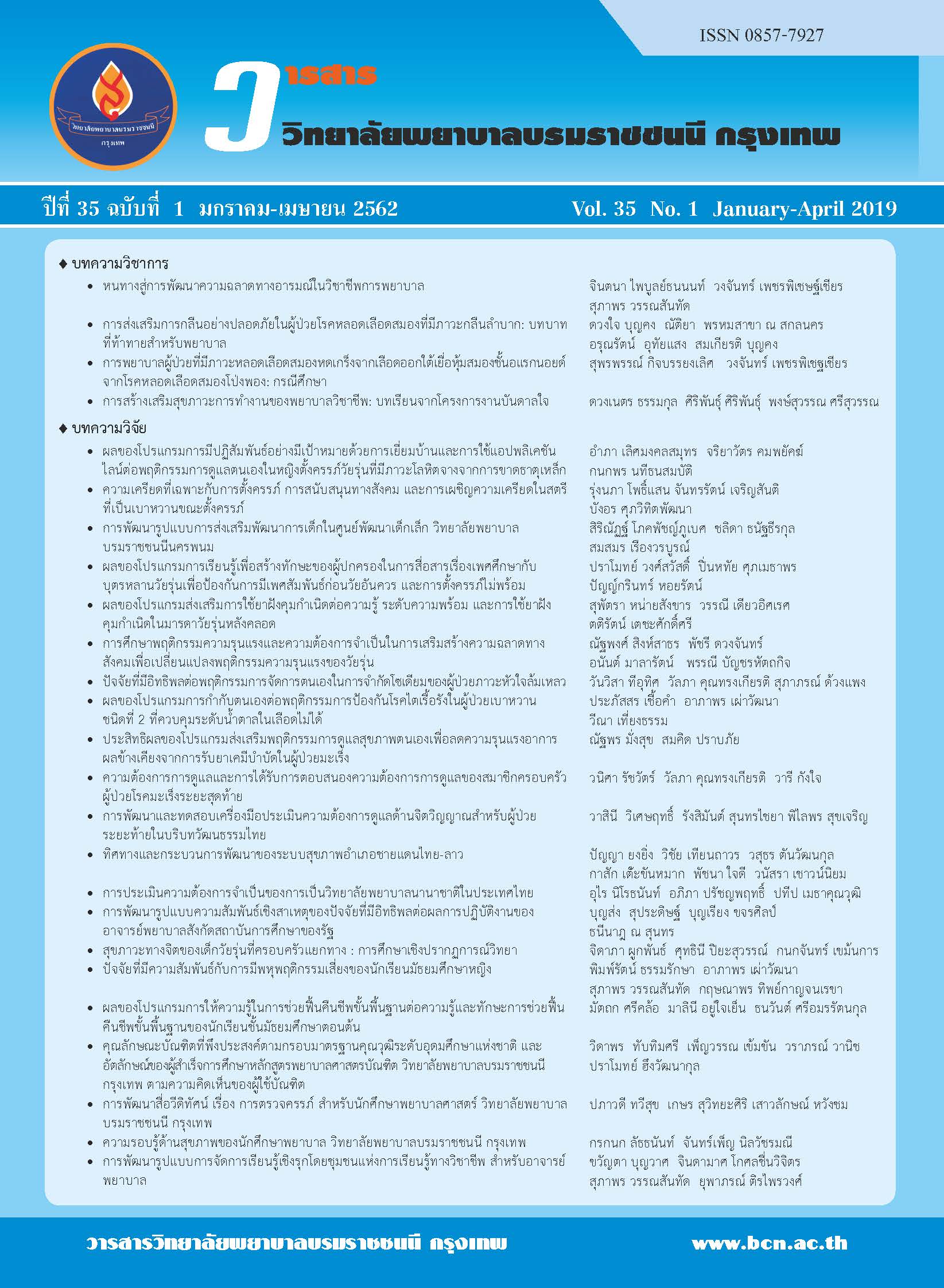สุขภาวะทางจิตของเด็กวัยรุ่นที่ครอบครัวแยกทาง : การศึกษาเชิงปรากฏการณ์วิทยา
คำสำคัญ:
เด็กวัยรุ่น, ครอบครัวแยกทาง, สุขภาวะทางจิตบทคัดย่อ
ปัจจุบันสถานการณ์ทางสังคมมีการเปลี่ยนแปลงในด้านต่างๆส่งผลให้อัตราการแยกทางกันของสามีภรรยาเพิ่มสูงขึ้น ในทุกสังคม เด็ก ๆ จากครอบครัวนั้นต้องตกอยู่ในสภาพแวดล้อมที่ครอบครัวแตกแยกและมีปัญหาด้านจิตใจอย่างหลีกเลี่ยง ไม่ได้ ดังนั้น จึงจำเป็นอย่างยิ่งที่จะต้องมีการศึกษาวิจัยเกี่ยวกับการรับรู้และความพึงพอใจในชีวิตหรือสุขภาวะทางจิตใจ ของประชากรกลุ่มนี้ โดยเฉพาะในช่วงวัยรุ่น การศึกษาวิจัยเชิงคุณภาพแบบปรากฏการณ์วิทยาเชิงพรรณนาภายใต้แนวทาง ของ Husserl1 ครั้งนี้ มีวัตถุประสงค์เพื่ออธิบายถึงสุขภาวะทางจิตใจของวัยรุ่นที่มาจากครอบครัวแตกแยก ผู้ให้ข้อมูล คือ วัยรุ่นจำนวน 50 คนที่มาจากครอบครัวแตกแยกในจังหวัดมหาสารคามซึ่งเต็มใจที่จะเข้าร่วมการศึกษาครั้งนี้ดำเนินการเก็บรวบรวมข้อมูลโดยการสัมภาษณ์แบบเจาะลึกและการสนทนากลุ่ม
ผลจากการวิเคราะห์ข้อมูลเชิงเนื้อหาตามแนวทางของ Colaizi9 พบว่า มีประเด็นสำคัญ 4 ประการ คือ 1) การยอมรับ ตนเองซึ่งเป็นองค์ประกอบหลักของสุขภาวะทางจิตใจ 2) ความสัมพันธ์กับผู้อื่น 3) การจัดการกับสถานการณ์ต่างๆ และ 4) จุดประสงค์ในชีวิต ผลการวิจัยในครั้งนี้สามารถนำไปใช้เป็นความรู้พื้นฐานในการดูแลวัยรุ่นที่มีครอบครัวแตกแยก และการศึกษาวิจัยเพิ่มเติมในอนาคต
Downloads
เอกสารอ้างอิง
2. U.S. Census Bureau. “Table 4. Poverty Status of Families, by Type of Family, Presence of Related
Children, Race, and Hispanic Origin: 1959 to 2008,” (cited 2010 April 21). Available from: www.
census.gov/hhes/www/poverty/histpov/hstpov4.xls
3. Child Trends. Family Structure: Indicators on Children and Youth. 2013. (Cited 2015 Oct 27). Available from: http://www.childtrends.org/wpcontent/uploads/2011/ 12/59_Family_Structure. 2013.
4. Office of Women's Affairs and Family Development. Interesting statistics to analyze the family
dimension. The research department; Office of Women's Affairs and Family Development. 2013.
5. McLanahan S, Percheski C. Family structure and the reproduction of inequalities. Annual Review
of Sociology. 2008; 34:257–76
6. Troxel WM, Lee L, Hall M, Matthews KA. Single parent family structure and sleep problems in
black and white adolescents. Sleep Medicine. 2014;15:255-261.
7. Sackss V, Moore KA, Shaw A, Cooper PM. The family environment and adolescent well-being. Child Trends. 2014;1-12.
8. Ryff CD, Singer B. Psychological well-being: Meaning, measurement, and Implications for
psychotherapy research. Psychotherapy and Psychosomatics. 1996; 65(1):14-23.
9. Colaizzi P. Psychological research as the Phenomenologist views it. In Existential Phenomenological
Alternatives for Psychology (Valle R. & King M. eds). Oxford University Press, London. 1978: 48-71.
10. Plodpluang U. Data analysis in Phenomenology Studies. Nursing Journal of the Minsistry of Public
Health [Internet]. 1 [cited 20Apr.2019]; 23(2):1-0. Available from: https://www.tci-thaijo.org/index.
php/tnaph/article/view/11885
11. Lincoln YS, Guba EG. Naturalistic inquiry. Beverly Hills, CA: Sage; 1985.
12. Saikai R. Broken family: Its causes and effects on the development of children. International
Journal of Applied Research. 2017; 3(2):445-8.
13. Samutasadong W. Solving child problem 2013. “Children with Divorced Parents Problems”.
Research report. 2012. (Cited 2018 July 10). Available from: http://taamkru.com/th/%E0%B9%80
%E0%B8%94%E0%B9%87%E0%B8%81%E0%B8%9A%E0%B9%89%E0%B8%B2%E0%B8%99%E0
%B9%81%E0%B8%95%E0%B8%81/ (in Thai)
14. Wiriyamotree S. The study of self-esteem of teenage studens of divorced families in Bangkok.
Master of social science, Institute for Population and Social Research: Mahidol University. 2008. (in Thai)
15. Burton N. Divorce Effect On Kids: Do You Wish Your Parents Had Split? The Huffington Post. 2012.
(cited 2018 May 18). Available from: htttp://www.huffingtonpost.com/Natasha-burton/
divorce-effect-on-kids_b_1601627.html.
16. Thoranee R, Thephak R, Muansith A. Dynamics adjustment and living of child in divorced family.
Bangkok: Rajamangala University of Technology Phra Nakhon. 2008. (in Thai)
17. Uwaifo VO. The effects of family structures on the academic performance of Nigerian University
students. Global. Journal of Human Social Science 2012;12(2):53-6.
18. Aktar S. Effects of Family Breakup on Children: A Study in Khula City. Bangladesh e-Journal of
Sociology 2013;10(1):138-52.
19. Uratanamanee S, Wacharasin C, Jongudomkarn D. The context of single mother families: A study
of adolescent’s lived experiences. Journal of Health Science Research 2016;10(1):32-8. (in Thai)
20. Diener E. Subjective well-being. Psychological Bulletin 1984;95:542–75.
ดาวน์โหลด
เผยแพร่แล้ว
รูปแบบการอ้างอิง
ฉบับ
ประเภทบทความ
สัญญาอนุญาต
บทความที่ได้รับการตีพิมพ์ เป็นลิขสิทธิ์ของวารสารวิจัยสุขภาพและการพยาบาล (วิทยาลัยพยาบาลบรมราชชนนี กรุงเทพ) ไม่สามารถนำไปตีพิมพ์ซ้ำในวารสารฉบับอื่น


















